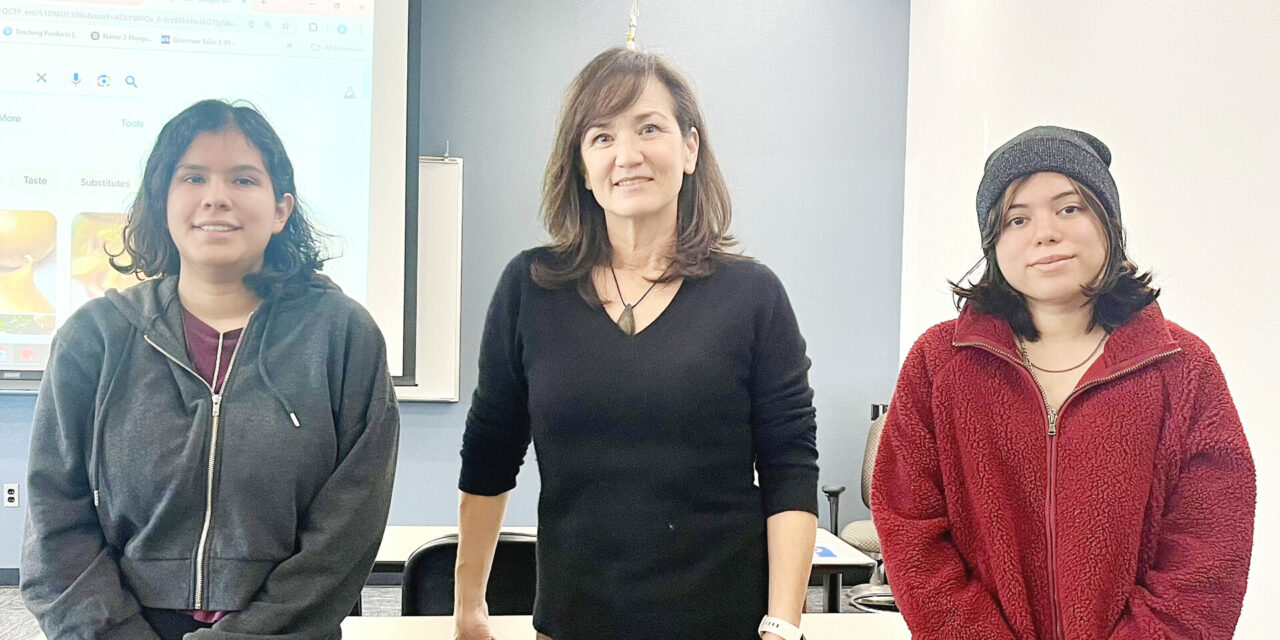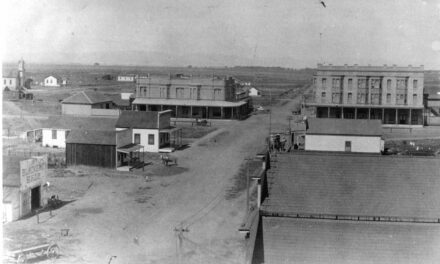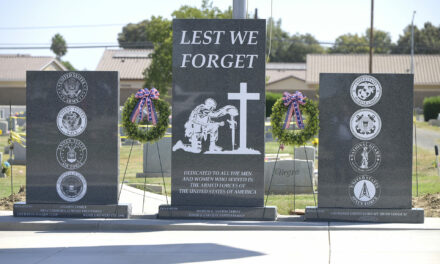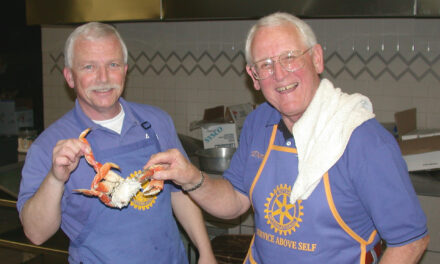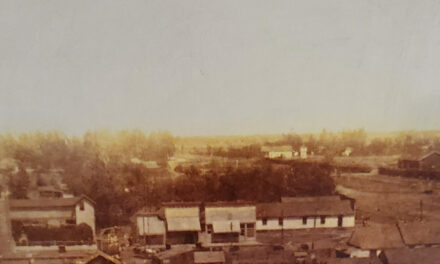BY GUADALUPE AND IRMA ESQUIVEL
Special to the Express
(Editor’s note: The following article was written by two college students at the Los Banos Campus of Merced College interested in American history, who recently interviewed a Japanese American professor teaching at the Los Banos Campus.)
The surprise Japanese attack on Pearl Harbor that occurred just before 8 a.m. on Sunday, Dec. 7, 1941, has special meaning to Professor Sheryl Okuye, an instructor at the Los Banos Campus of Merced College.
The attack killed over 2,430 American service men. It also resulted in displacing thousands more U.S. citizens like her Japanese grandparents and her father, who were forced into internment at the Merced County Fairgrounds.
The lives of her grandparents, Kiyoshi and Chiyo Okuye, and their young son Paul (her father), were disrupted as they were forced to leave their farm in the Yamato Colony in the Livingston area.
The attack caused President Franklin D. Roosevelt to decare war on Japan as the United States entered World War II. It also led President Roosevelt to issue Executive Order 9066, which called for the internment of suspicious aliens identified as German, Italia, and Japanese aliens who were suspected of being potential enemy agents.
By January 1942, the act was expanded to include not only suspicious aliens whose origins were in belligerent nations, but all persons of Japanese descent whether foreign-born or American citizens. Her grandparents and father were among those relocated to the camps.
Her grandmother, Okuye said, was 44 years old, her grandfather between 44 and 47 years old, and her father 9 years old when they were brought to the internment camps. The family stayed for three years, from 1942-1945. Okuye noted this was recorded in a book about Merced area records.
When her grandparents received the news of the internment camps, Okuye said, her family felt scared, scared of leaving their property and pets since they were told that they could only bring what they could carry.
Her grandmother was more terrified and worried because she had four children to care for. Some of the things they would bring included bed sheets and plates. Okuye also said that some families found that their houses had been shot at when they returned from the camps in 1945.
Okuye’s grandparents recounted that they recognized some friends since people in the camps were grouped by region. The teenagers would benefit from this the most since they could talk with their friends more and socialize with teenagers from other regions.
According to her grandparents’ account, living conditions in the camp were horrible. There weren’t any clean sleeping areas. It felt as if they weren’t treated as people since they were given small rooms, or cots, that had no privacy.
Okuye said her family was temporarily in a stable because the internment camps were still developing. The stable was so unsanitary that there was animal manure still covering the floors. This would lead to some outbreaks of disease in the early years of the internment camps.
Her grandparents, Okuye said, and others who were in the internment camps generally had nothing negative to say about their treatment. However, she said that there were some situations where people got shot from the watchtowers.
People in the camps were generally considered so respectful and peaceful that those living outside the camps even tried to help them.
According to Okuye’s father’s account, he and the rest of the children felt awful seeing their parents having no parental authority that they normally had. Seeing his parents struggling with this distressed him and made him feel depressed.
Although the children and teenagers at the camp socialized more, the parents had nothing else to do. For example, since the food was always provided to them, the older women could not practice their traditions relating to cooking food.
Among other challenges, Okuye said that her family thought it was horrible because there was no privacy in the rooms or in the bathrooms. Most people would decide to use the toilets during the night to get some privacy.
As time went on, and parents couldn’t demonstrate authority, it did not feel like a family. It felt like they were prisoners.
One memorable aspect of living in the internment campus was baseball. It felt like that sport was aiding them throughout their struggle. Okuye even mentioned that there was one movie made about these camps that centered on baseball.
Her grandparents, during their internment, felt like they had to prove that they were Americans, Okuye said. They didn’t express any negativity or hatred to the government.
When they were told they could leave, Okuye said, her family felt excited and could not wait to return home. However, some would choose not to return to the West and move to other states.
Some felt devastated because most of the people lost everything, such as their property, belongings, and pets. In her family’s case, they had secured their property because their lawyer had maintained it and communicated with the family.
It was difficult when her grandparents had to return to society and live a normal life, Okuye said. Japanese Americans were still subject to lots of prejudice. Her father saw a lot of this when he returned to school, where he and his Japanese friends would be called names.
Some Japanese Americans would get shot by passersby near their homes. When they called the police, the police would do nothing to resolve the hate crimes.
Young adults who were brought to the internment camps during college couldn’t go back to school since they were busy supporting their families. Some would sell the little they had to get basic necessities.
Okuye’s uncle, she remembered, would carry traumas from when he was in the 442nd Infantry Regiment. He could recall a time when a group of soldiers from Texas were surrounded by German soldiers in France.
The 442nd were told to go and recover those soldiers. It was scary. Although the Japanese Americans were soldiers in the army serving their country, they were still treated as foreigners.
Years after the event, formerly imprisoned Japanese Americans and their families were compensated by the government. Okuye said that the main thing that they were happy for was that it was recognized the internment was wrong. They appreciated the apology from the government; the money, they felt, was not as important.
Unfortunately, by the time compensation was approved, many people who had been interned, including her grandparents and father, had passed away by then. The ones who remained were the children of some of the interned prisoners.
Okuye believes that the wording used to describe the internment process was not accurate. For example, the U.S. government used the word “evacuation” instead of “forced removal.”
“Evacuation” sounds like people were guided from their homes to safety and provided with helpful services. “Forced removal,” which better illustrates what happened to Japanese Americans, is when people are forcefully taken from their homes. The purpose behind this language was to make the United States’ actions sound better than what they actually were.
Okuye said that while she is not planning on writing a book, she is thinking about documenting the event thoroughly. She has in mind turning one of their homes into a bed-and-breakfast, preserving the stories that she obtained from other people and using her grandmother’s old passport and other historical documents for her documentation.
Okuye said that she had always known about her family’s past. She said she could remember walking around the foundation of the internment camp. She thought it was horrible that people went through this.
As she got older, she had a different understanding of what those people went through. For example, as a teenager, she could understand what the teenagers felt like. And as a mother, she understood the fear parents and mothers had for their families.
Okuye believes there was no reason for Japanese Americans to be forcefully removed and placed into those camps, since they had done nothing to alarm people. She also mentioned that there haven’t been any documented cases of Japanese Americans being spies.
One final note; Professor Okuye still lives on the family farm in the house her grandfather built. She teaches English as a Second Language classes at the Los Banos Campus of Merced College.
